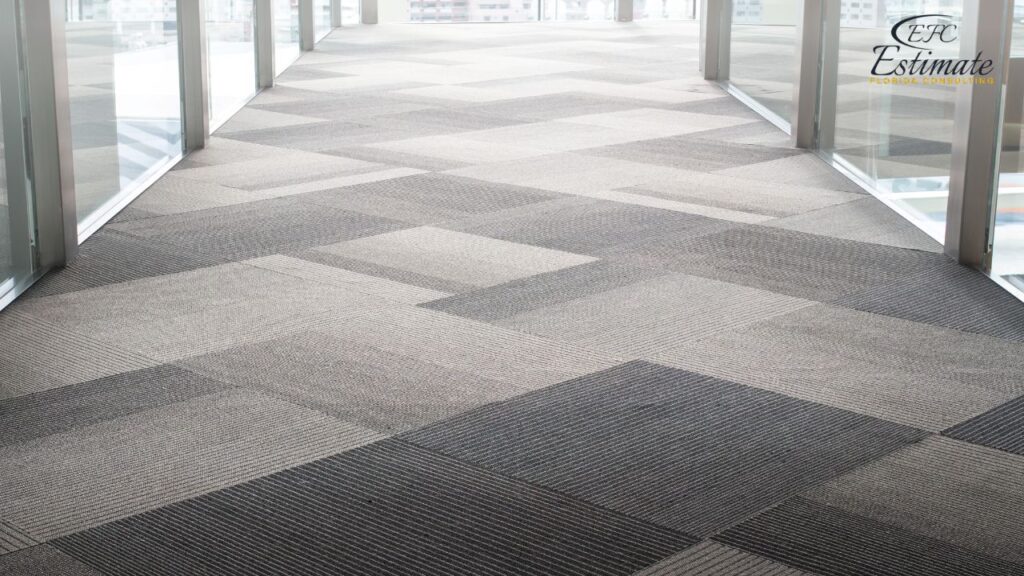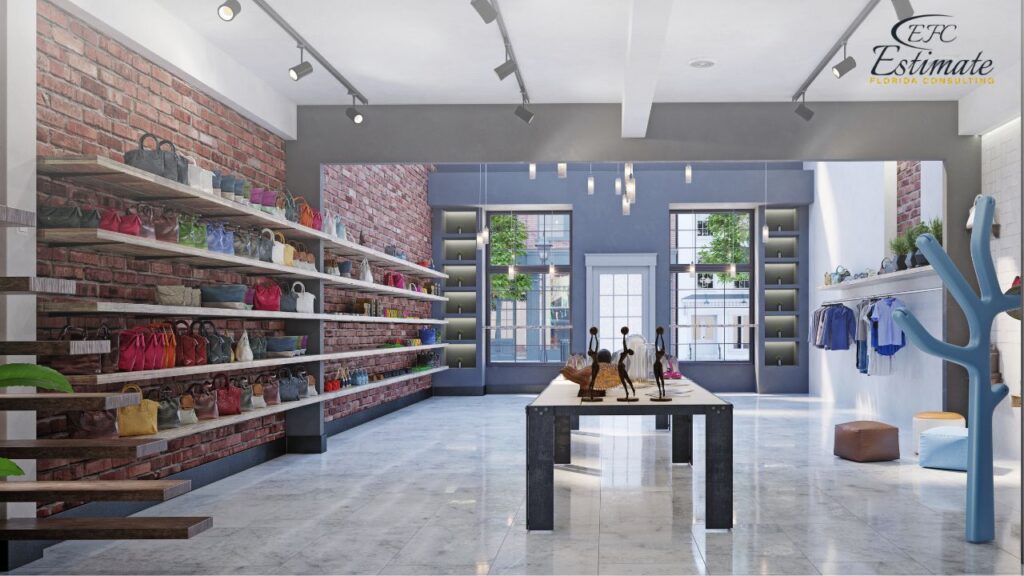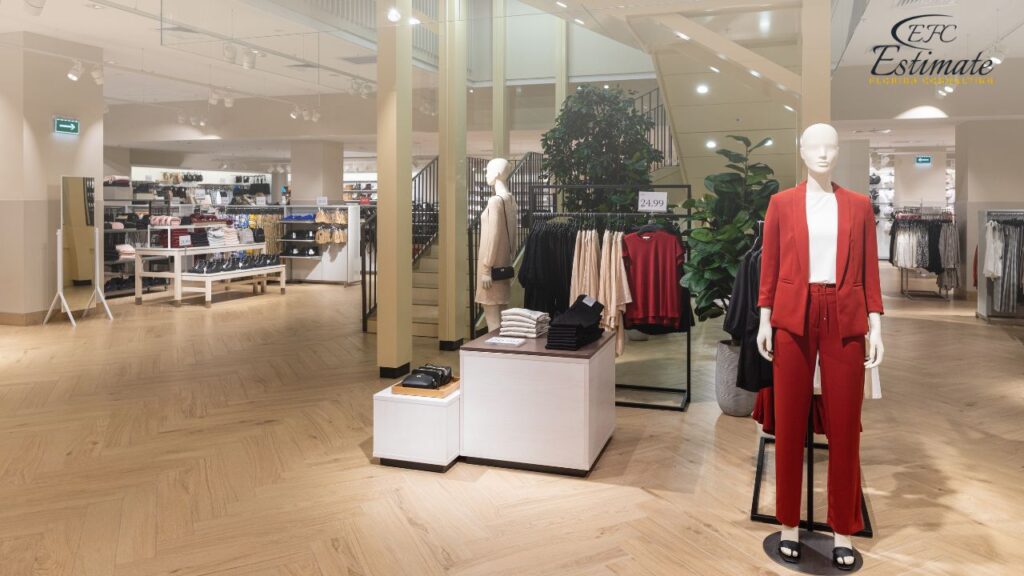Bid Confidently, Bid Successfully – Try Our Flooring Cost Estimates!
- Accurancy
- Efficiency
- Transparency
- Customization
- Time Saving
- Professionalism
- Cost Control

Flooring in retail environments goes beyond mere functionality; it plays a pivotal role in shaping the customer’s shopping experience, reinforcing brand identity, and ensuring safety. For retail chain stores, replacing flooring is not just a maintenance task but a strategic decision that impacts aesthetics, operations, and the bottom line.In the low range, typically encompassing basic materials such as vinyl tile, low-grade laminate, or commercial carpeting, the total cost for a 5,000 square foot retail store might now fall between $6,500 to $19,500 or more.

Moving into the mid-range, which involves higher quality materials like higher-grade laminate, engineered hardwood, or mid-range commercial carpeting, the total cost could range from $19,500 to $45,500 or more. At the high end, where premium materials such as hardwood, natural stone, or luxury vinyl tile are utilized, the total cost for the same-sized store could exceed $45,500 and potentially reach upwards of $97,500 or above.

Fully Insured License Hire Contractor For Flooring Installation
Hire Contractor
Make Informed Design Decisions Showcase Your Design Ideas
Get RenderingOn average, installing or replacing flooring incurs a total cost ranging from $6 to $20 per square foot. This expense is heavily influenced by both the type of flooring and the condition of the area. Flooring materials can vary in price from $3 to $65 per square foot, while labor costs typically range from $4 to $10 per square foot.
Floor size (square feet) | Average total cost installed |
200 | $1,040 – $3,900 |
500 | $2,600 – $9,750 |
1,000 | $5,200 – $19,500 |
1,200 | $6,240 – $23,400 |
1,500 | $7,800 – $29,250 |
1,700 | $8,840 – $33,150 |
2,000 | $10,400 – $39,000 |
2,500 | $13,000 – $48,750 |
3,000 | $15,600 – $58,500 |
Flooring in retail settings must meet high standards of appearance and durability. Consistency across locations strengthens brand identity, while the choice of material must withstand high foot traffic and require minimal downtime for maintenance. Additionally, sustainability has become a critical factor, with many retailers aiming to minimize their environmental footprint.
The flooring in a retail space not only needs to align with the brand’s image but also withstand high foot traffic and require minimal maintenance. Let’s delve into the costs and performance of the most popular flooring materials in the retail sector.


A comparative analysis reveals that while hardwood and tile offer long-term durability and aesthetic appeal, their initial costs and maintenance requirements may not suit all retail environments. Laminate and vinyl provide cost-effective alternatives with considerable durability and a wide range of design options, making them suitable for many retail settings. Carpet, while economical and comfortable, may require more frequent replacement in high-traffic areas.
Innovative flooring solutions are transforming retail spaces, enhancing customer experiences, and meeting sustainability goals. Understanding these trends is vital for retailers aiming to make informed decisions about flooring that offers the best return on investment.
Receive highly accurate estimates tailored to your zip code, giving you the edge to secure more projects. Upload your plans and start winning!
Materials offering longer lifecycles and those manufactured through energy-efficient processes are gaining traction. Retailers are increasingly considering the total lifecycle cost, including end-of-life recycling, to make more sustainable and cost-effective flooring choices.
While some innovative materials and technologies may come with a higher initial cost, their long-term benefits in durability, maintenance savings, and customer appeal can justify the investment.
The growing consumer preference for sustainable and health-conscious environments also influences flooring selections, with eco-friendly materials often leading to a stronger brand image and customer loyalty.

To begin the process, conduct thorough research to identify suppliers known for their commitment to sustainability and innovation in the flooring industry. Utilize various resources such as trade shows, industry publications, and online directories to compile a list of potential partners. Look for suppliers with a diverse range of products that align with your retail needs, as well as a demonstrated commitment to sustainability practices and technological advancements.
Once you have identified potential suppliers, initiate contact with a clear introduction and statement of your interest in their product lines. Express genuine interest in their offerings and inquire about their sustainability practices and technological innovations. Building a personal connection with suppliers can help establish trust and pave the way for fruitful discussions.
Regular communication is essential for nurturing relationships with suppliers. Consider subscribing to newsletters or product updates to stay informed about their latest offerings and initiatives. Additionally, engage in open dialogue to discuss your retail needs and explore how their products can meet your requirements.
Suppliers often possess in-depth knowledge of their products and industry trends. Take advantage of their expertise by consulting with them on the best flooring solutions for your retail environments. Collaborate on custom designs or materials that align with your brand values and customer expectations, leveraging the supplier’s insights to enhance the overall shopping experience.
As your relationship with suppliers evolves, discuss potential partnership agreements that offer mutual benefits. Negotiate terms that may include volume discounts, exclusive access to new products, or collaborative marketing efforts. These agreements can provide financial advantages and ensure your retail spaces remain innovative and competitive in the market.
Before implementing new flooring materials across all retail locations, consider conducting pilot projects in select stores. This allows you to test the performance, durability, and customer response to the products in a real-world setting. Collect feedback from store managers and customers to evaluate the effectiveness of the flooring solutions and make any necessary adjustments before a full rollout.
Given the growing emphasis on sustainability among retailers and consumers, prioritize working with suppliers that offer eco-friendly products. Look for materials with recycled content, certifications from environmental standards organizations, and a commitment to reducing environmental impact throughout the supply chain. Collaborating on sustainability initiatives can enhance your brand’s reputation and appeal to eco-conscious consumers.

Provide suppliers with feedback on product performance, including any challenges encountered or positive outcomes observed during the pilot projects. This feedback is valuable for continuous improvement and can lead to collaborative efforts in developing future products that better meet the needs of retail environments. Maintain open communication with suppliers to foster a collaborative relationship built on trust and shared goals.
Selecting the right flooring for retail chain stores involves a multifaceted approach, considering factors such as appearance, durability, maintenance requirements, and sustainability. Hardwood flooring offers a classic, upscale look but comes with higher initial costs and maintenance needs. Laminate and vinyl flooring provide cost-effective alternatives with good durability and a wide range of design options suitable for various retail settings. Tile flooring offers premium durability and aesthetic appeal but may require more maintenance. Carpet, while economical and comfortable, may need more frequent replacement in high-traffic areas. Retailers are increasingly embracing innovative materials like bamboo, cork, and recycled options to align with sustainability goals and customer preferences. Engaging with leading suppliers who prioritize sustainability and innovation is crucial for selecting flooring solutions that enhance the customer experience while meeting operational needs.
Flooring in retail environments goes beyond functionality; it significantly impacts the customer’s shopping experience, brand identity, and safety. Therefore, replacing flooring is a strategic decision that influences aesthetics, operations, and the bottom line.
Key considerations include meeting high standards of appearance and durability, maintaining consistency across locations to strengthen brand identity, choosing materials that withstand high foot traffic and require minimal maintenance, and prioritizing sustainability to minimize environmental footprint.
Common flooring materials include hardwood, laminate, vinyl, tile, and carpet. Each material has varying initial costs, durability, maintenance requirements, and aesthetic appeal, making them suitable for different retail environments.
Innovative flooring trends include the use of eco-friendly materials like bamboo and cork, recycled and reclaimed materials, advanced technologies such as smart floors and wearable flooring technology, and aesthetic innovations like customizable digital printing and interactive flooring.
Retail chain stores can engage with suppliers known for their commitment to sustainability and innovation by conducting thorough research, initiating contact, building relationships, leveraging supplier expertise, negotiating partnership agreements, implementing pilot projects, prioritizing sustainability, providing feedback, and maintaining open communication.
Here I am going to share some steps to get your flooring replacement cost for Retail Chain Stores estimate report.
You can send us your plan on info@estimatorflorida.com
Before starting your project, we send you a quote for your service. That quote will have detailed information about your project. Here you will get information about the size, difficulty, complexity and bid date when determining pricing.
Our team will takeoff and estimate your project. When we deliver you’ll receive a PDF and an Excel file of your estimate. We can also offer construction lead generation services for the jobs you’d like to pursue further.



561-530-2845
info@estimatorflorida.com
Address
5245 Wiles Rd Apt 3-102 St. Pete Beach, FL 33073 United States
561-530-2845
info@estimatorflorida.com
Address
5245 Wiles Rd Apt 3-102 St. Pete Beach, FL 33073 United States
All copyright © Reserved | Designed By V Marketing Media | Disclaimer